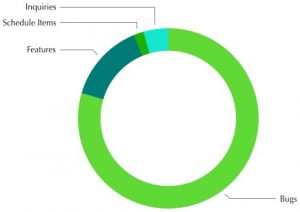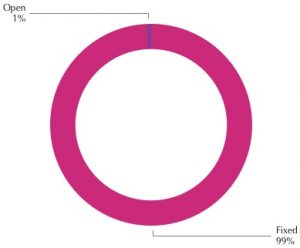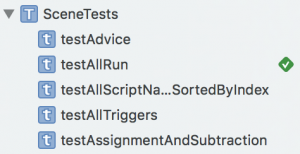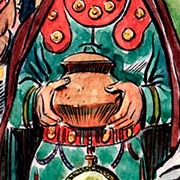Like King of Dragon Pass, Six Ages logs all scripts, which helps show exactly what happened and the state of the game.
Right now a lot of my time is spent fixing bugs in the code. Given that the game is large and complex, it can be hard to know just what happened that led up to a bug. So we keep track of everything important.
This is actually something that we did in King of Dragon Pass. Shawn Steele was implementing our scripting language, OSL, and wanted a way to check that things like conditionals and calculations worked. So he came up with a way to log this to a file. You can see his focus from some of the options:
kAllBranches = 0x01,
kListSizeing = 0x02,
kTraceOSL = 0x04,
kTraceMath = 0x08, // Extra COSL::StartMath debugging information
kSetVariables = 0x10,
kTraceFixed = 0x20, // Extra CFixed debugging information
kLoadVariables = 0x40,
kGetStrings = 0x80,
kTraceTribes = 0x100,
kTraceOSLVariables = 0x200, // CFixed::PrintFileDebug should print OSL Variable Names the hard way
kTraceMathResult = 0x400,
kTraceList = 0x800, // Attempt to show list content
The output shows addresses and opcodes, showing its focus on debugging the language:
OSL 0xd8b694 Running from 0, fRunDepth 0:
-------------------------------------------
0000 : 0202 019E Picture "scene018"
0002 : 0203 0001 Position 0001
0005 : 4005 E
Loading Variable 4005 (E) 0.000 (gValue)
0006 : 0800 =
0007 : 068D RandomElement
0008 : 0480 (
0009 : 070E ClanMembers
000A : 0841 - (subtract)
000B : 0718 RingMembers 7ffa0000 -- P00000000:0021a700 (gValue)
Result: 7ffa0000 -- P00000000:005e18fe (gValue)
000C : 0481 ) -- gValue = 7ffa0000 -- P00000000:005e18fe (gValue)7ff20001.0000 : Brenna (gValue)
Setting Variable 4005 (E)
Result: 7ff20001.0002 : Brenna (gValue)
000E : 4021 otherClan
Loading Variable 4021 (otherClan)7ff30017.0000 : Blue Jay (gValue)
000F : 0800 =
0010 : 068D RandomElement
0011 : 0480 (
0012 : 068A NeighboringClans
4 COSL::Neighbors:
Clans:
9 Boskovi
15 Blackrock
18 Greydog
23 Blue Jay
0013 : 0481 ) -- gValue = 7ffb0000 -- C00000000:00848200 (gValue)7ff30012.0000 : Greydog (gValue)
Setting Variable 4021 (otherClan)
Result: 7ff30012.0000 : Greydog (gValue)
0015 : 4012 R
Loading Variable 4012 (R) 0.000 (gValue)
0016 : 0800 =
0017 : 0600 FALSE 0.000 (gValue)
Setting Variable 4012 (R)
Result: 0.000 (gValue)
0018 : 0212 01A4 Saga "<4005> told us we should take in Orlkensor Bronzebones, a warrior outlawed by the <21>.plural."
Loading Variable 4005 (E)7ff20001.0002 : Brenna (gValue)
ReplacePlaceHolders...7ff20001.0002 : Brenna (gValue)
Loading Variable c321 (otherClan)00000000.0000 : Greydogs (gValue)
ReplacePlaceHolders...00000000.0000 : Greydogs (gValue)
001A : 0201 01CF Music "IsItAdventure"
001C : 0A00 NewChoices
Once OSL was reliable, it turned out that the log was useful to help debug the OSL scripts themselves. If something weird happened, you could see what code branch was taken, and what some of the variables were. For example, the output above shows all the neighboring clans
And we output other information to the log, such as the scene queue, some of the clan decisions, and more.
The debug log can grow quite large (a quick search shows one at 7.7 MB), so the game makes a new one every time you launch. But if you had to relaunch because of a crash, that would mean that any evidence would be deleted. So actually, we rename the log, and actually delete the previous one.
While I reworked OSL for Six Ages, I based it on Shawn’s work, and wasn’t so concerned about debugging the language itself. Instead, I wanted to focus on the scripts, since that seemed like where most of the bugs would be.
<OSL: 0x170194ec0> ® 2 Affiance her to …
-----------------
: Saga "We affianced her to <.an> <ourClan> groom." {a} {C_1 Arrowstone}
: (ourClan).commoners {277}
: +=
: # 1 {277} {278}
ourClan.commoners ← 278
: ChooseYesNo
: (
: String "Do you accept the 10 cows?"
: ) ↖︎ = Do you accept the 10 cows?
sendToCurrentScene: kNewChoice
… exploded
Restarting OSL (self.result=kNewChoice)
This is more compact (thus easier to read): more values are shown on the same line, and it doesn’t bother to show addresses or opcodes.
The next post will talk more about how to make use of this.
 123 Inquiries. This includes playtester feedback and comments, and 75 completed games. I try to do some analysis of each game, to learn where players get stuck and to make sure things are tuned OK. Once in a while this uncovers bugs.
123 Inquiries. This includes playtester feedback and comments, and 75 completed games. I try to do some analysis of each game, to learn where players get stuck and to make sure things are tuned OK. Once in a while this uncovers bugs. 2695 of 2714 bugs have been closed. A few are still being verified as fixed, or were deferred for an update. (That’s about 1.8 bugs per day over the entire project.)
2695 of 2714 bugs have been closed. A few are still being verified as fixed, or were deferred for an update. (That’s about 1.8 bugs per day over the entire project.)
 Another timing bug (reported by a playtester) had to do with when the followup for an omen occurred. And another was a possible conflict with the seasonal calendar (you might be willing to ignore the harvest, but would your allies?).
Another timing bug (reported by a playtester) had to do with when the followup for an omen occurred. And another was a possible conflict with the seasonal calendar (you might be willing to ignore the harvest, but would your allies?). One game had very few raids. I looked at the logs and data, and made some adjustments to what are probably the underlying causes. (Raids look at many factors, such as relative strength and different aspects of inter-clan relationships.)
One game had very few raids. I looked at the logs and data, and made some adjustments to what are probably the underlying causes. (Raids look at many factors, such as relative strength and different aspects of inter-clan relationships.) Given how many scenes are in the game, I figure any bug is probably somewhere else as well. So figured I should go back to our
Given how many scenes are in the game, I figure any bug is probably somewhere else as well. So figured I should go back to our  Right now, the game is undergoing internal testing while being finished. Most of the bugs are easy to deal with: fix a typo, clarify something that’s unclear, fix a logic error, or make sure advice and recommendation match.
Right now, the game is undergoing internal testing while being finished. Most of the bugs are easy to deal with: fix a typo, clarify something that’s unclear, fix a logic error, or make sure advice and recommendation match.